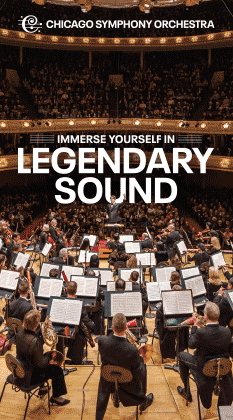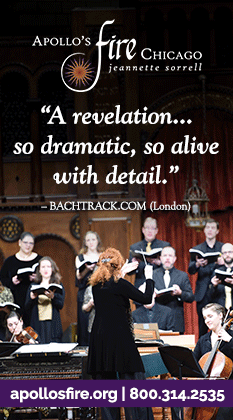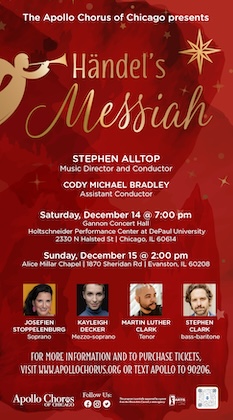Hahn’s spacious, searching Sibelius a highlight with CSO

A reshuffling of program and podium accompanied Thursday night’s concert by the Chicago Symphony Orchestra.
Finnish conductor Mikko Franck bowed out of this week’s concerts because he was unable to fly due to “a serious ear infection,” according to his management as relayed in a CSO press release on Monday. Marin Alsop, music director of the Baltimore Symphony Orchestra, was available to take over the podium duties for this program.
Unfortunately, Franck’s cancellation also adversely affected part of the evening’s lineup. The scheduled opener, A Requiem in Our Time by Franck’s compatriot Einojuhani Rautavaara was jettisoned, thereby losing one of the few 20th-century rarities on the CSO calendar this season. Replacing that offbeat brass-and-percussion work was Brahms’ Academic Festival Overture, which didn’t display a whole lot of daring or imagination.
That said, Brahms’ overture has a certain resonance this time of year with commencement exercises in abundance. Alsop managed to freshen up Brahms’ warhorse in a graceful yet robust reading—giving warmth to the “collegiate” theme, bringing forward the restless horn writing, and drawing a surprising degree of excitement in the final section.
The rest of the scheduled program was unchanged, including what proved to be the evening’s highlight, Sibelius’s Violin Concerto with Hilary Hahn as solo protagonist.
Hahn remains one of our finest violinists and one was expecting something special from the Baltimore native in this Finnish warhorse, a work she recorded with great success a decade ago with Esa-Pekka Salonen (adventurously coupled with a brilliant and unequalled performance of the Schoenberg Violin Concerto).
The intelligence and sterling technique that the violinist brings to her playing were manifest in Thursday’s uniquely compelling performance. While “revelatory” would be an overstatement, Hahn’s thoughtful approach resulted in an uncommonly fresh account of Sibelius’s concerto.
Above all, this was a searching and spacious performance. Hahn’s hushed opening notes immediately riveted attention, and she brought an individual, often surprising touch to her phrasing and dynamics that kept one slightly unsettled—in a good way—wondering what she might do next.
The austere Northern quality was manifest, with the soloist drawing out the ruminative expression of many solo passages. This kind of lingering on phrase ends could easily sound mannered or indulgent from a lesser artist but Hahn gave the sustained notes an affecting, expressive poignance. Time and again—as in her first cadenza— there was an individual approach to rubato, accents and phrasing that made this performance distinctive.
The Adagio was rapt and lyrical, with the violinist’s slender-silvery tone winnowed down to the barest shimmering thread at the coda. In the galumphing dance of the final movement, Hahn dug deeply into her instrument, throwing off the relentless insistence of the main theme and ratcheting up the mounting fiddle bravura to an exhilarating finish.
Unfortunately, Alsop’s support was not on the same level, her lumbering accompaniment often lagging behind the violinist. Phrasing was segmented, and sections ill-blended and raucous. The conductor’s pokey direction of the finale was no match for the tensile, whipcrack virtuosity of her soloist.
Thursday night’s uninhibited audience brought Hahn out for repeated curtain calls. One hoped for a Bach encore from the finest Bach violinist of our day but no luck. Perhaps at a later performance this weekend.
Alsop appeared more in her element with Rachmaninoff’s Symphony No. 2 after intermission.
Here too one wanted more polishing of details and better blending and balances than the music sometimes received from the podium. Yet Alsop built the long paragraphs of the vast opening movement surely and inexorably to a powerful climax. The second movement was aptly spirited and driving with a richly luxuriant presentation of the arching middle theme.
Stephen Williamson—the sole woodwind principal playing this week—lifted a clarinet solo in the Adagio of touching simplicity and Alsop judged the ebb and flow of the melodic waves with skill. Apart from her bizarre agogic hiccup in a cello passage, Alsop led the finale—Rachmaninoff’s most unreservedly joyous inspiration— to a rousing and exuberant conclusion with all due brassy clamor.
The program will be repeated 8 p.m. Friday and Saturday and 7:30 p.m. Tuesday. cso.org; 312-294-3000.
Posted in Performances





